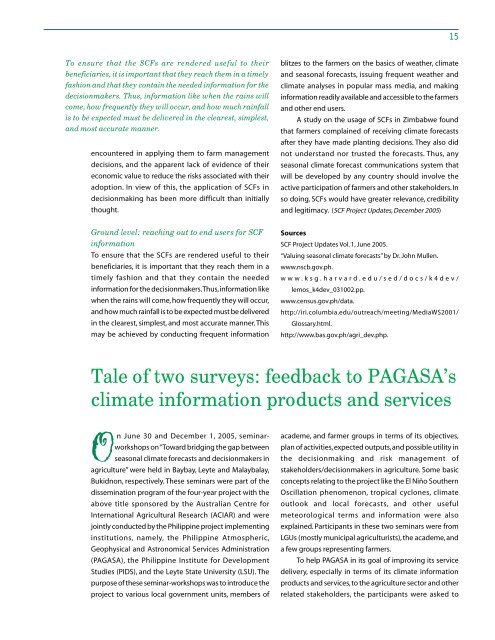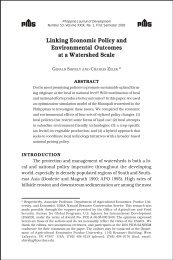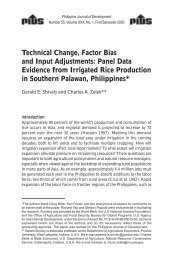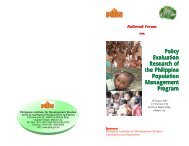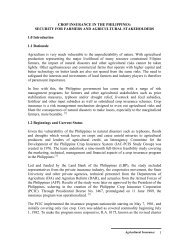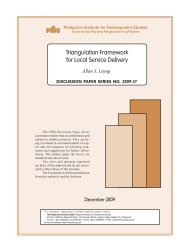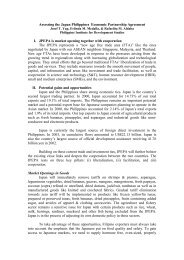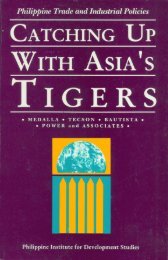Read More - Philippine Institute for Development Studies
Read More - Philippine Institute for Development Studies
Read More - Philippine Institute for Development Studies
Create successful ePaper yourself
Turn your PDF publications into a flip-book with our unique Google optimized e-Paper software.
15<br />
To ensure that the SCFs are rendered useful to their<br />
beneficiaries, it is important that they reach them in a timely<br />
fashion and that they contain the needed in<strong>for</strong>mation <strong>for</strong> the<br />
decisionmakers. Thus, in<strong>for</strong>mation like when the rains will<br />
come, how frequently they will occur, and how much rainfall<br />
is to be expected must be delivered in the clearest, simplest,<br />
and most accurate manner.<br />
encountered in applying them to farm management<br />
decisions, and the apparent lack of evidence of their<br />
economic value to reduce the risks associated with their<br />
adoption. In view of this, the application of SCFs in<br />
decisionmaking has been more difficult than initially<br />
thought.<br />
blitzes to the farmers on the basics of weather, climate<br />
and seasonal <strong>for</strong>ecasts, issuing frequent weather and<br />
climate analyses in popular mass media, and making<br />
in<strong>for</strong>mation readily available and accessible to the farmers<br />
and other end users.<br />
A study on the usage of SCFs in Zimbabwe found<br />
that farmers complained of receiving climate <strong>for</strong>ecasts<br />
after they have made planting decisions. They also did<br />
not understand nor trusted the <strong>for</strong>ecasts. Thus, any<br />
seasonal climate <strong>for</strong>ecast communications system that<br />
will be developed by any country should involve the<br />
active participation of farmers and other stakeholders. In<br />
so doing, SCFs would have greater relevance, credibility<br />
and legitimacy. (SCF Project Updates, December 2005)<br />
Ground level: reaching out to end users <strong>for</strong> SCF<br />
in<strong>for</strong>mation<br />
To ensure that the SCFs are rendered useful to their<br />
beneficiaries, it is important that they reach them in a<br />
timely fashion and that they contain the needed<br />
in<strong>for</strong>mation <strong>for</strong> the decisionmakers. Thus, in<strong>for</strong>mation like<br />
when the rains will come, how frequently they will occur,<br />
and how much rainfall is to be expected must be delivered<br />
in the clearest, simplest, and most accurate manner. This<br />
may be achieved by conducting frequent in<strong>for</strong>mation<br />
Sources<br />
SCF Project Updates Vol. 1, June 2005.<br />
“Valuing seasonal climate <strong>for</strong>ecasts” by Dr. John Mullen.<br />
www.nscb.gov.ph.<br />
www.ksg.harvard.edu/sed/docs/k4dev/<br />
lemos_k4dev_031002.pp.<br />
www.census.gov.ph/data.<br />
http://iri.columbia.edu/outreach/meeting/MediaWS2001/<br />
Glossary.html.<br />
http://www.bas.gov.ph/agri_dev.php.<br />
Tale of two surveys: feedback to PAGASA’s<br />
climate in<strong>for</strong>mation products and services<br />
On June 30 and December 1, 2005, seminarworkshops<br />
on “Toward bridging the gap between<br />
seasonal climate <strong>for</strong>ecasts and decisionmakers in<br />
agriculture” were held in Baybay, Leyte and Malaybalay,<br />
Bukidnon, respectively. These seminars were part of the<br />
dissemination program of the four-year project with the<br />
above title sponsored by the Australian Centre <strong>for</strong><br />
International Agricultural Research (ACIAR) and were<br />
jointly conducted by the <strong>Philippine</strong> project implementing<br />
institutions, namely, the <strong>Philippine</strong> Atmospheric,<br />
Geophysical and Astronomical Services Administration<br />
(PAGASA), the <strong>Philippine</strong> <strong>Institute</strong> <strong>for</strong> <strong>Development</strong><br />
<strong>Studies</strong> (PIDS), and the Leyte State University (LSU). The<br />
purpose of these seminar-workshops was to introduce the<br />
project to various local government units, members of<br />
academe, and farmer groups in terms of its objectives,<br />
plan of activities, expected outputs, and possible utility in<br />
the decisionmaking and risk management of<br />
stakeholders/decisionmakers in agriculture. Some basic<br />
concepts relating to the project like the El Niño Southern<br />
Oscillation phenomenon, tropical cyclones, climate<br />
outlook and local <strong>for</strong>ecasts, and other useful<br />
meteorological terms and in<strong>for</strong>mation were also<br />
explained. Participants in these two seminars were from<br />
LGUs (mostly municipal agriculturists), the academe, and<br />
a few groups representing farmers.<br />
To help PAGASA in its goal of improving its service<br />
delivery, especially in terms of its climate in<strong>for</strong>mation<br />
products and services, to the agriculture sector and other<br />
related stakeholders, the participants were asked to


